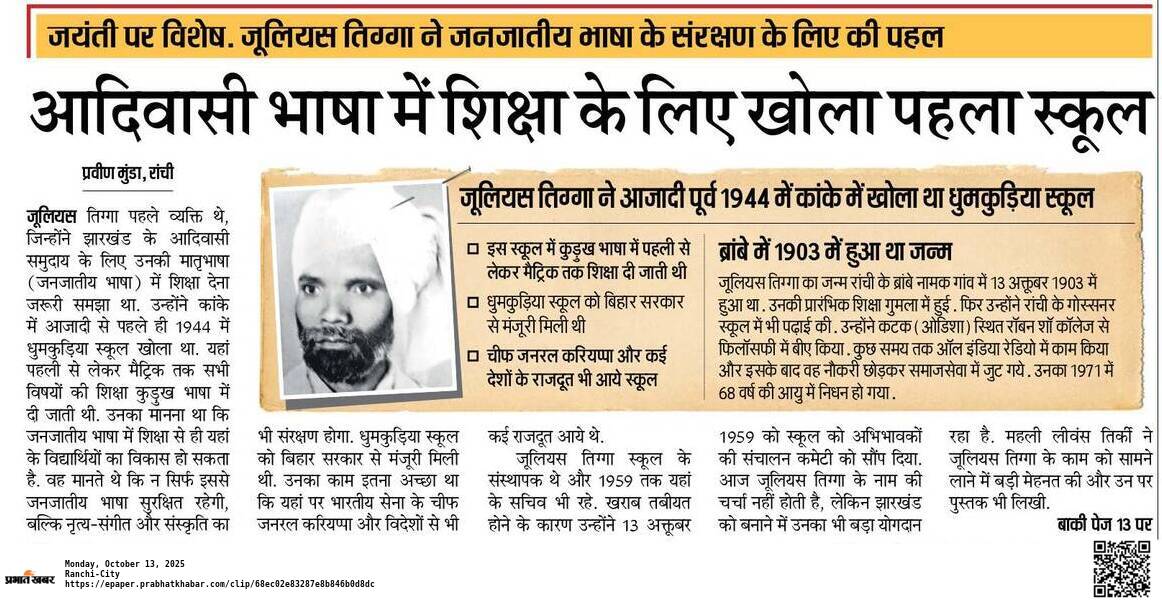Julius Tigga (13 October 1903-1971) was a pioneering tribal educationist, writer, editor, artist, cultural activist, politician, and organizer from Jharkhand. He stands as a towering figure in the first generation of India’s tribal movement, playing a crucial intellectual role in establishing Adivasi politics in India. His contributions to tribal education, journalism, and political activism have left an indelible mark on the history of Jharkhand and the broader Adivasi movement across India.
Quick Facts About Julius Tigga
| Full Name | Julius Tigga |
| Birth Date | 13 October 1903 |
| Death Year | 1971 |
| Key Role | General Secretary, Adivasi Mahasabha (1939-1948) |
| Major Contribution | Tribal Education, Adivasi Journalism, Political Activism |
| Notable Work | Founder of Dhumkuriya School, Editor of ‘Adivasi’ Journal |
Early Life and Background of Julius Tigga
Born on October 13, 1903, in the tribal heartland of Jharkhand, Julius Tigga belonged to a community that was facing unprecedented challenges during British colonial rule. The tribal communities of Jharkhand were experiencing social, economic, and political marginalization, which would later fuel Tigga’s passion for advocating indigenous rights and tribal empowerment. His early experiences with discrimination and exploitation shaped his worldview and commitment to social justice for Adivasi communities.
Julius Tigga’s Role in Adivasi Mahasabha
Julius Tigga served as the General Secretary of the Adivasi Mahasabha from 1939 to 1948, a pivotal period in Jharkhand’s political history. The Adivasi Mahasabha was one of the most important organizations working for tribal rights, autonomy, and political representation during the pre-independence and early post-independence era.
During his tenure, Tigga:
- Organized tribal communities across Jharkhand for political mobilization
- Advocated for land rights and protection of tribal territories
- Fought against exploitation by non-tribal landlords and moneylenders
- Built a network of tribal leaders and activists across the region
- Represented tribal interests in political negotiations with colonial and later Indian authorities
Pioneering Work in Adivasi Journalism
One of Julius Tigga’s most significant contributions was his work as an editor of the ‘Adivasi’ journal. He published this influential journal in both Hindi and various Adivasi languages of Jharkhand, making it accessible to a wide range of tribal readers. The journal became a powerful voice for:
- Indigenous rights and tribal autonomy
- Documentation of tribal customs, traditions, and culture
- Political awareness among Adivasi communities
- Critique of exploitative practices by outsiders
- Promotion of tribal unity and collective action
His fearless journalism and advocacy led to his imprisonment by authorities who saw his work as a threat to the established order. This sacrifice demonstrated Julius Tigga’s unwavering commitment to the tribal cause, earning him deep respect within the Adivasi community.
Revolutionary Contribution to Tribal Education: The Dhumkuriya School
Julius Tigga is perhaps best remembered for his pioneering work in tribal education. Recognizing that the colonial education system was alienating tribal children from their cultural roots, he established the innovative Dhumkuriya School. This school was revolutionary for several reasons:
Traditional Teaching Methods
The Dhumkuriya School employed traditional indigenous teaching methods rather than imposing Western educational models. This approach:
- Respected and preserved tribal knowledge systems
- Used oral traditions, storytelling, and community-based learning
- Incorporated practical skills relevant to tribal livelihoods
- Taught in local tribal languages alongside Hindi
- Emphasized cultural values and community solidarity
Cultural Preservation
The Dhumkuriya School served as more than just an educational institution. It became a center for:
- Preserving tribal languages, songs, and folklore
- Teaching traditional arts and crafts
- Maintaining connection with ancestral knowledge
- Building pride in tribal identity among young Adivasis
Political and Cultural Activism
Beyond education and journalism, Julius Tigga was deeply involved in cultural and political activism. He understood that tribal empowerment required multiple approaches:
- Political Representation: He fought for tribal representation in political bodies and decision-making processes
- Cultural Revival: He promoted tribal art, music, and cultural practices as sources of pride and identity
- Economic Justice: He advocated for fair wages, land rights, and protection from exploitation
- Social Reform: He worked to eliminate harmful practices while preserving beneficial tribal traditions
Legacy and Impact of Julius Tigga on Jharkhand
Julius Tigga is remembered as a towering intellectual and activist whose work fundamentally shaped the modern Adivasi movement in India. His vision for educational and political empowerment continues to influence tribal society in Jharkhand and beyond. His legacy includes:
- Inspiring generations of tribal activists and leaders
- Establishing models for culturally appropriate tribal education
- Creating a foundation for tribal political consciousness
- Demonstrating the importance of indigenous journalism and media
- Showing how cultural pride and political activism can work together

Relevance Today
The struggles and achievements of Julius Tigga remain highly relevant in contemporary India. As tribal communities continue to face challenges related to land rights, cultural preservation, and political representation, Tigga’s life and work provide inspiration and guidance. His emphasis on:
- Education rooted in indigenous knowledge
- Media as a tool for community empowerment
- Political organization and collective action
- Cultural pride as a foundation for resistance
These principles continue to guide Adivasi movements in Jharkhand and across India.
Conclusion
Julius Tigga’s life represents a remarkable chapter in the history of Jharkhand and India’s tribal movement. As an educationist, journalist, politician, and cultural activist, he worked tirelessly to empower Adivasi communities and preserve their unique heritage. His establishment of the Dhumkuriya School, his leadership in the Adivasi Mahasabha, and his courageous journalism created lasting institutions and inspired countless individuals. Today, as we reflect on his contributions, Julius Tigga stands as a symbol of tribal resilience, intellectual leadership, and unwavering commitment to justice and dignity for indigenous peoples.


